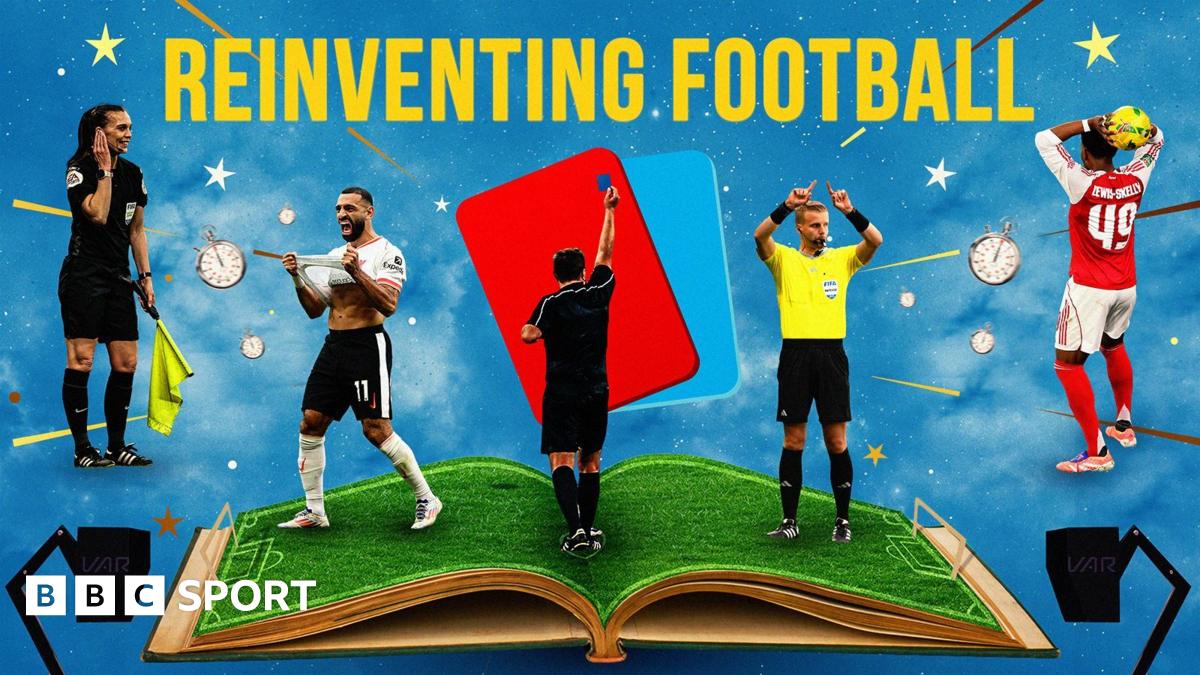**Reinventing Football: A Manifesto for the Beautiful Game**
Imagine a world in which you could reinvent football. It’s a dream, of course—just a bit of fun—but stick with us. What if you had the power to change the game’s laws and finally end countless hours of debate about handball, offside, VAR, or anything else you please? In that spirit, we talked to players, pundits, and even referees about what football could look like if we started completely from scratch. Think of this as a manifesto for reinventing the game so many of us love.
—
### Rethinking Penalties: Is the Punishment Fair?
Consider that relatively innocuous trip as an attacker moves away from goal or a handball with no immediate threat. The result? A penalty—and a very high chance of a goal (historically, Opta says, 78%) when no such opportunity really existed. Is it fair, for example, that Brentford were given such a high chance of scoring when Liverpool defender Virgil van Dijk tapped Dango Ouattara’s boot right on the edge of the 18-yard box last month? Is a shot from 12 yards against only the goalkeeper truly a just punishment?
We already define an “obvious goalscoring opportunity” for a red card, so why not tweak the rules to award a penalty only when a goalscoring chance is denied? If the foul has no clear attacking impact, a free-kick feels fairer. Cynical or deliberate fouls? Still a spot-kick.
—
### Penalty Rebounds: Should Attackers Get a Second Chance?
Imagine a world where, if a penalty is saved or hits the woodwork and bounces back into play, the game stops and the ball is given to the goalkeeper. Pierluigi Collina, perhaps the most iconic referee of all time and now FIFA’s head of referees, supports this. Collina argues: if the attacking team has missed such a big chance, why do they deserve a second or even third opportunity?
In recent seasons, only about three goals per season are scored this way, so would we be losing much? Of course, we might give up some memorable moments—think Chloe Kelly’s 119th-minute goal for England against Italy at Euro 2025, or Liverpool’s Xabi Alonso scoring on the rebound against AC Milan in the 2005 Champions League final, or Harry Kane’s rebound goal for England at Euro 2020.
If this change happened, even the look of the pitch might shift—the “D” at the edge of the penalty area (to keep players 10 yards away) wouldn’t be necessary anymore.
—
### VAR: Stick or Twist?
Will VAR ever be truly accepted? Perhaps not in its current form. How about adapting football to a challenge system, similar to cricket?
FIFA’s Football Video Support (FVS), trialed in several leagues including Spain’s top women’s division, gives coaches two challenges per game. When used, the on-field referee reviews footage at the monitor. There’s no VAR official making judgments—just a replay operator.
England goalkeeper Jordan Pickford likes the idea: “With VAR involved, I’d do it like cricket. They’ve got two decisions and the captain must choose wisely, in so many seconds. That keeps the game flowing.”
There are merits. Theoretically, there will be better final decisions, though mistakes can still occur. Match of the Day presenter Gabby Logan suggests another solution: a strict 90-second time limit on VAR reviews. If it’s not clear and obvious in that time, it shouldn’t be changed.
But for former England defender Stephen Warnock, it’s simpler: get rid of VAR altogether. “I’m fed up with players not celebrating, fans not knowing what’s going on, and endless inconsistencies,” he said.
—
### Offside: Rethink or Remove It?
The offside law is very different from its 1863 origins, when you were offside if ahead of the ball—a bit like rugby. Three years later, they changed it to involve defenders’ positions and it’s stayed largely the same since. But should a player really be penalized for having a toe in front of the “offside line”?
VAR claims to be precise, but it depends on humans confirming the exact frame and the tech can be confusing. How about ditching millimetre-level judgment, relying instead on TV pictures and an official’s eye, as they do in Major League Soccer? If VAR can’t clearly see the assistant’s decision is wrong, the call stays.
Premier League referee Anthony Taylor suggests an even more radical idea: scrapping offside entirely. “One of the best tournaments I refereed in was a prison officer tournament with no offside. We had so many goals it was unbelievable,” he said.
—
### Handball: Back to Basics?
Ask a football fan from a decade ago what handball is, and you’d get a simple answer. Today? Not so much. Former England captain Alan Shearer said, “For me, it’s pretty simple— is it deliberate handball or not?”
A 2019 law rewrite tried to bring “clearer and more consistent interpretation,” but only resulted in more penalties and confusion. Maybe it’s time to trust referees’ instincts again and get back to basics.
—
### Timekeeping: Guaranteed Playing Time
There’s long been talk of making each half 30 minutes with a stopped clock when the ball’s out of play, guaranteeing 60 minutes of effective play. Currently, the average ball-in-play time is about 55 minutes. It’s not a perfect fix—teams can still slow things to break momentum—and matches might take longer overall (the NFL’s 60-minute games often last more than three hours).
Former Wales captain Ashley Williams also advocates for tactical timeouts. “I’d give each team at least one timeout per half, to use whenever—before a corner, before a free-kick, if someone’s injured,” he said. Teams already manufacture unofficial timeouts by sending a goalkeeper down “injured” for tactical talks.
Could banning group touchline meetings or forcing an outfielder off for 30 seconds when a keeper is treated solve some issues? Maybe, but not all.
—
### Bonus Points for Goals: Reward the Attackers
Arsene Wenger often spoke of giving teams extra points for attacking play, as seen in the 2009 Emirates Cup (three points for a win, plus one for each goal scored). Former Manchester City defender Nedum Onuoha echoes this: “I like the idea of a bonus point for every time you score two goals. You’d see more attacking football and more entertainment.”
Former Barcelona and Manchester United defender Gerard Pique has a different take: award zero points for a 0-0 draw. Teams might attack relentlessly to avoid a scoreless game, knowing it’s as costly as defeat.
Of course, there could be times when sharing zero points is better than risking a bigger loss, but it would certainly make for exciting endings.
—
### Free-Kicks: The Self-Pass Solution
Consider this: a player is fouled and wants to restart quickly, but must wait for their team to set up. What if any player could take a free-kick, throw-in, or corner by themselves and just run? It sounds radical, but would make games faster and perhaps even more entertaining.
Former England midfielder Danny Murphy supports it: “It’s your advantage—you’ve got the ball, so why pass to someone else just to restart?”
Murphy also suggests an automatic penalty for anyone caught diving or cheating—a bold deterrent indeed.
—
### Increase the Size of Goals?
In 1996, then-FIFA president Sepp Blatter proposed increasing goal sizes by 50cm in width and 25cm in height, but it never gained traction. The current goal size (24ft x 8ft) hasn’t changed in 150 years, even as goalkeepers have grown significantly taller. Does this give them an unfair advantage?
On the flip side, modern balls are lighter and attackers are more athletic than ever. Do they really need more goal to aim at? It’s a debate likely to continue.
—
**Conclusion**
Football has evolved tremendously over the years, but that doesn’t mean it can’t be improved. From penalties and VAR to handball and offside, many rules could be reimagined to make the game faster, fairer, and more entertaining.
What would you change about the beautiful game? Share your thoughts in the comments below!
https://www.bbc.com/sport/football/articles/ckgk1vglkepo?xtor=AL-72-%5Bpartner%5D-%5Byahoo.north.america%5D-%5Bheadline%5D-%5Bsport%5D-%5Bbizdev%5D-%5Bisapi%5D



